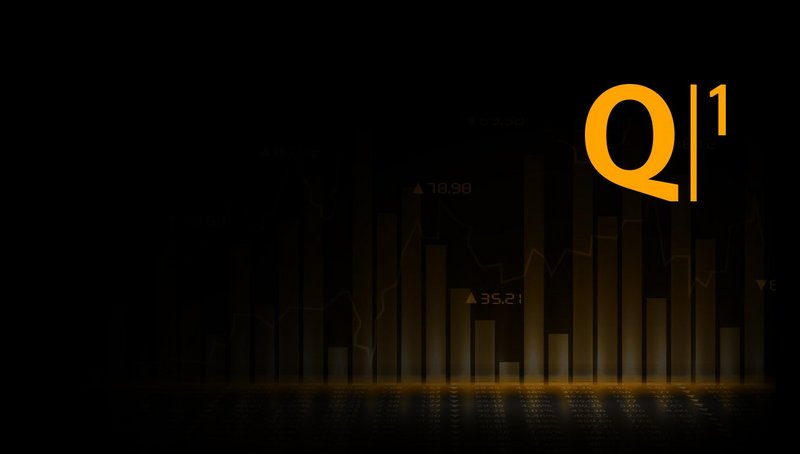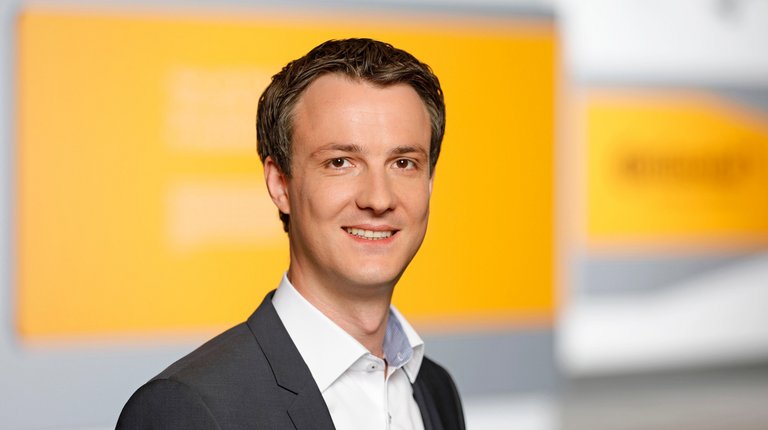Continental Reports Strong Tire Business in the First Quarter
- Consolidated sales of €9.3 billion (Q1 2021: €8.6 billion, +8.2 percent)
- Adjusted EBIT of €439 million (Q1 2021: €728 million, -39.8 percent)
- Adjusted EBIT margin of 4.7 percent (Q1 2021: 8.5 percent)
- Operating result of €375 million (Q1 2021: €663 million, -43.4 percent)
- Net income of €245 million (Q1 2021: €448 million for continuing and discontinued operations)
- Free cash flow before acquisitions and divestments (adjusted free cash flow)
of -€174 million(Q1 2021: €646 million for continuing and discontinued operations) - CEO Nikolai Setzer: “Price increases in procurement and logistics affected us significantly in the first quarter. Despite this considerable headwind, we achieved a good result in the tire business.”
- Expectations for fiscal 2022: consolidated sales of around €38.3 billion to €40.1 billion; adjusted EBIT margin of around 4.7 to 5.7 percent
- Recycling of scrap tires to be further optimized and expanded
Hanover, May 11, 2022. Continental performed well in the first quarter of 2022 despite an increasingly turbulent market environment, reporting strong tire business. Many external factors, such as the war against Ukraine, the coronavirus pandemic, electronic component shortages and cost increases in procurement and logistics, presented major challenges. Consolidated sales in the past quarter were €9.3 billion (Q1 2021: €8.6 billion, +8.2 percent), and adjusted EBIT was €439 million (Q1 2021: €728 million, -39.8 percent), corresponding to an adjusted EBIT margin of 4.7 percent (Q1 2021: 8.5 percent).
“The past quarter was overshadowed by the war against Ukraine and its drastic effects on already high energy prices and strained logistics chains and commodity markets. In addition, measures to contain the coronavirus pandemic, particularly in China, had an adverse effect on economic development. In view of the multiple challenges, we took various steps to minimize the impact on earnings,” said Nikolai Setzer, CEO of Continental, on Wednesday in Hanover, adding: “Price increases in procurement and logistics affected us significantly in the first quarter. Despite this considerable headwind, we achieved a good result in the tire business. For Automotive, we are confident that the measures taken will result in improved earnings over the course of the year.”
Continental took immediate action to address the numerous challenges and effectively maintain production and supply chains, for example by further diversifying raw material sources at an early stage, building up security stocks and reorganizing its value chain in the electronics sector. Continental is also working with its customers to share the burden of increased costs.
In the first quarter of 2022, Continental generated a net income of €245 million (Q1 2021: €448 million for continuing and discontinued operations). Adjusted free cash flow was -€174 million (Q1 2021: €646 million for continuing and discontinued operations).
“Adjusted free cash flow in the first quarter of this year was negative due primarily to higher procurement costs and inventory buildup. For the year as a whole, we anticipate an adjusted free cash flow of around €0.6 billion to €1.0 billion,” explained Katja Dürrfeld, CFO of Continental. The higher inventories are the result of increased security stocks for raw materials and semi-finished products and the seasonal buildup in the tire sector.
Weak automotive production in the first quarter
In the first three months of the year, global automotive production was significantly lower than in the first quarter of the previous year. The market for passenger cars and light commercial vehicles in Europe fell particularly sharply (3.8 million units, -19.1 percent). North America also recorded a slightly weaker start to the year compared with the previous year’s quarter
(3.6 million units, -1.8 percent). In China, the production of passenger cars and light commercial vehicles was up year-on-year (6.1 million units, +6.1 percent). According to preliminary figures, global production of passenger cars and light commercial vehicles fell by 4.5 percent compared with the first quarter of 2021 to a total of 19.7 million units (Q1 2021: 20.7 million units).
Development of the group sectors
The weak automotive production in conjunction with increasing procurement and logistics costs impacted the Automotive group sector in particular. Its sales increased by 3.2 percent to €4.2 billion (Q1 2021: €4.1 billion). After adjusting for exchange-rate effects and changes in the scope of consolidation, it posted organic sales growth of -1.2 percent. The Automotive group sector therefore outperformed the market, with global automotive production falling by 4.5 percent in the first quarter of this year. Its adjusted EBIT margin was -3.9 percent (Q1 2021: 2.4 percent).
The Tires group sector achieved a good result, recording increased sales volumes in the car tires and commercial-vehicle tires replacement business compared with the previous year. With sales of €3.3 billion (Q1 2021: €2.7 billion, +20.1 percent), it achieved an adjusted EBIT margin of 17.1 percent (Q1 2021: 16.6 percent). Inventory valuation had a positive effect of around €200 million on earnings due to increased acquisition and production costs.
The considerable cost increases for procurement and logistics also affected the ContiTech group sector, which posted sales of €1.6 billion (Q1 2021: €1.5 billion, +3.3 percent) and an adjusted EBIT margin of 5.4 percent (Q1 2021: 10.2 percent). The conveyor belt and industrial hose businesses performed particularly well. Sales in the drive belt and air spring replacement business also rose.
Expectations for fiscal 2022
Market developments will continue to be characterized by high volatility in the coming months. After a production output of 77.1 million passenger cars and light commercial vehicles last year, Continental expects an increase of between 4 and 6 percent for the year as a whole (previously: 6 to 9 percent). Negative effects from cost inflation for key inputs, especially for
oil-based raw materials as well as for energy and logistics in Tires and ContiTech, continue to become significantly more material.
Continental has therefore adjusted its outlook for the year as a whole, as reported
on April 21, 2022. Consolidated sales are now expected to be around €38.3 billion to €40.1 billion (previously: around €38 billion to €40 billion), and the adjusted EBIT margin is expected to be around 4.7 to 5.7 percent (previously: around 5.5 to 6.5 percent).
For the Automotive group sector, Continental expects sales of around €17.8 billion to €18.8 billion (previously: around €18 billion to €19 billion) and an adjusted EBIT margin in the range
of around -0.5 to 1 percent (previously: around 0 to 1.5 percent). This still includes higher procurement and logistics expenses of around €1 billion as well as additional expenses for research and development of around €100 million in the Autonomous Mobility business area.
For the Tires group sector, Continental expects sales of around €13.8 billion to €14.2 billion (previously: around €13.3 billion to €13.8 billion) and an adjusted EBIT margin
of around 12.0 to 13.0 percent (previously: around 13.5 to 14.5 percent).
This includes a year-on-year increase in procurement and logistics costs
of around €1.9 billion (previously: around €1 billion).
For the ContiTech group sector, sales of around €6.3 billion to €6.5 billion
(previously: around €6.0 billion to €6.3 billion) and an adjusted EBIT margin of around 6.0 to 7.0 percent (previously: around 7.0 to 8.0 percent) are expected. This includes a year-on-year increase in procurement and logistics costs of around €600 million
(previously: around €300 million).
Capital expenditure before financial investments is expected to total around 6 percent of sales (previously: less than 7 percent).
Adjusted free cash flow is expected to be around €0.6 billion to €1.0 billion (previously: around €0.7 billion to €1.2 billion).
In the event the geopolitical situation, in particular in Eastern Europe, remains tense or worsens, it could result in further lasting consequences for production, supply chains and demand. In addition, further negative effects could arise as a result of the ongoing coronavirus pandemic and the related supply situation. Depending on the severity of the disruption, this may result in lower sales and especially earnings in all group sectors as well as for the Continental Group compared to the prior year.
Recycling of scrap tires to be further optimized and expanded
By 2050 at the latest, Continental aims to use 100 percent sustainable materials in its tire production. To achieve this goal, Continental is consistently expanding its activities in areas such as the circular economy. Recently, the DAX-listed company concluded a development agreement with Pyrum Innovations, a specialist in scrap tire pyrolysis, to further optimize and expand the recycling of scrap tires. In the medium term, for example, the aim is to obtain particularly high-quality industrial carbon black for Continental’s tire production. Carbon black is an important component in many tire compounds. Continental began delivering scrap tires to Pyrum in March 2022. In the long term, a closed circular economy concept is to be developed for scrap tire recycling.
Continental is also the first tire manufacturer to introduce recycled polyester yarn obtained from used PET bottles into its volume production. This new high-performance material is initially being used in selected sizes of the Continental PremiumContact 6 and EcoContact 6 summer tires as well as in the AllSeasonContact year-round tire. Around 40 recycled PET bottles that would otherwise have been incinerated for thermal recovery are used for each set of standard car tires. The specially developed ContiRe.Tex technology, which was made ready for volume production in just a few months, does not require any intermediate chemical steps and is significantly more energy-efficient than previous technologies.
New ContiTech plant in India
In April, Continental inaugurated its new plant in Pune, India. Here, ContiTech produces surface materials, primarily for the Indian automotive and two-wheeler market. Continental has invested more than €20 million in the facilities and machines for producing high-quality surface materials. Spanning around 14,000 square meters, the production plant has an initial annual capacity
of 5 million square meters of surface materials. This can be expanded to up to 10 million square meters. The new plant features first-class energy efficiency standards, sustainable production processes, an ergonomic work environment, 100 percent wastewater treatment, exhaust air purification for all processes and the use of energy from renewable sources.
Strong order intake in the first quarter
Continental also received two production orders for display solutions in the first quarter, with a combined sales volume of more than €2.5 billion. In total, the Automotive group sector generated an order intake in the first quarter of 2022 of more than €5.8 billion (Q1 2021: €3.9 billion).
Moreover, Continental is further expanding its global activities in advanced driver assistance systems and automated driving, as well as strengthening its development locations in Germany. The technology company has thus begun with the expansion of its location in Memmingen and the planning for a new central location in Neu-Ulm. Up to 150 staff will be employed at the new development campus in Memmingen. The new building is set to be completed and occupied by mid-2023. The prior expertise of three locations and up to 700 employees will be consolidated in Neu Ulm. The start of construction is scheduled for December 2022, with completion planned in 2024. In total, Continental plans to invest just under €75 million in the two locations over the coming three years.
Overview of all available materials: Results Q1 | 2022





